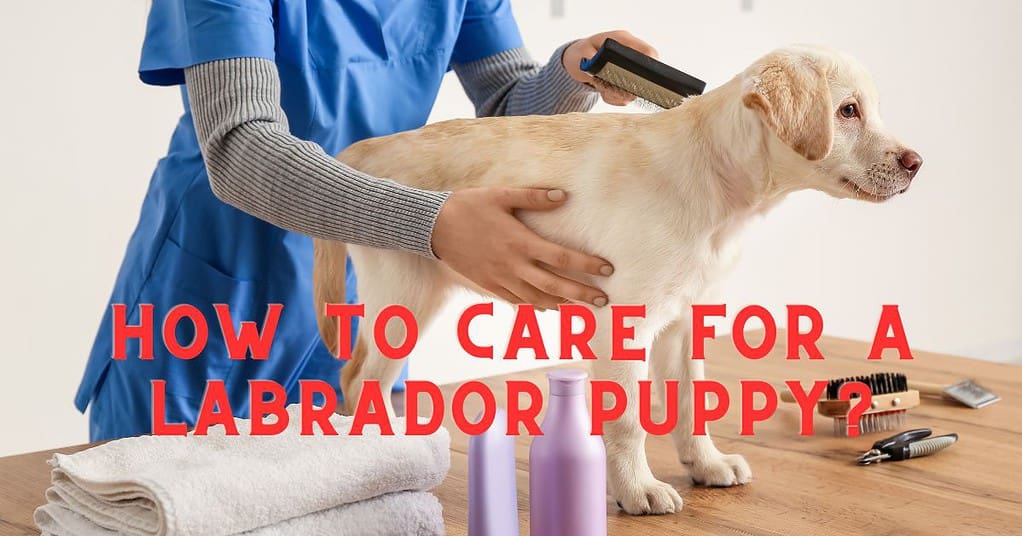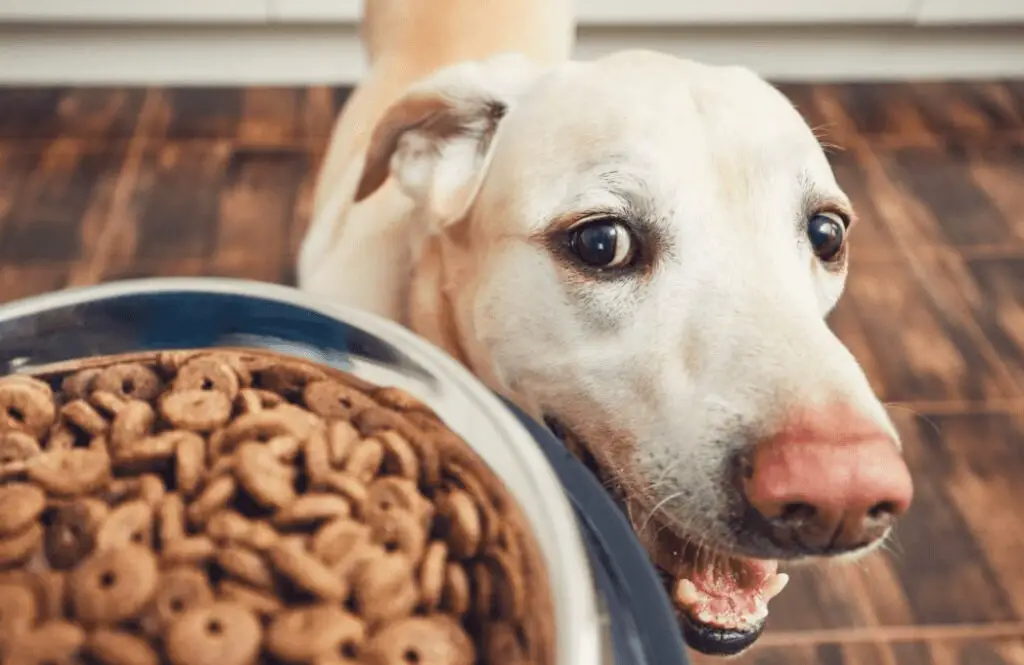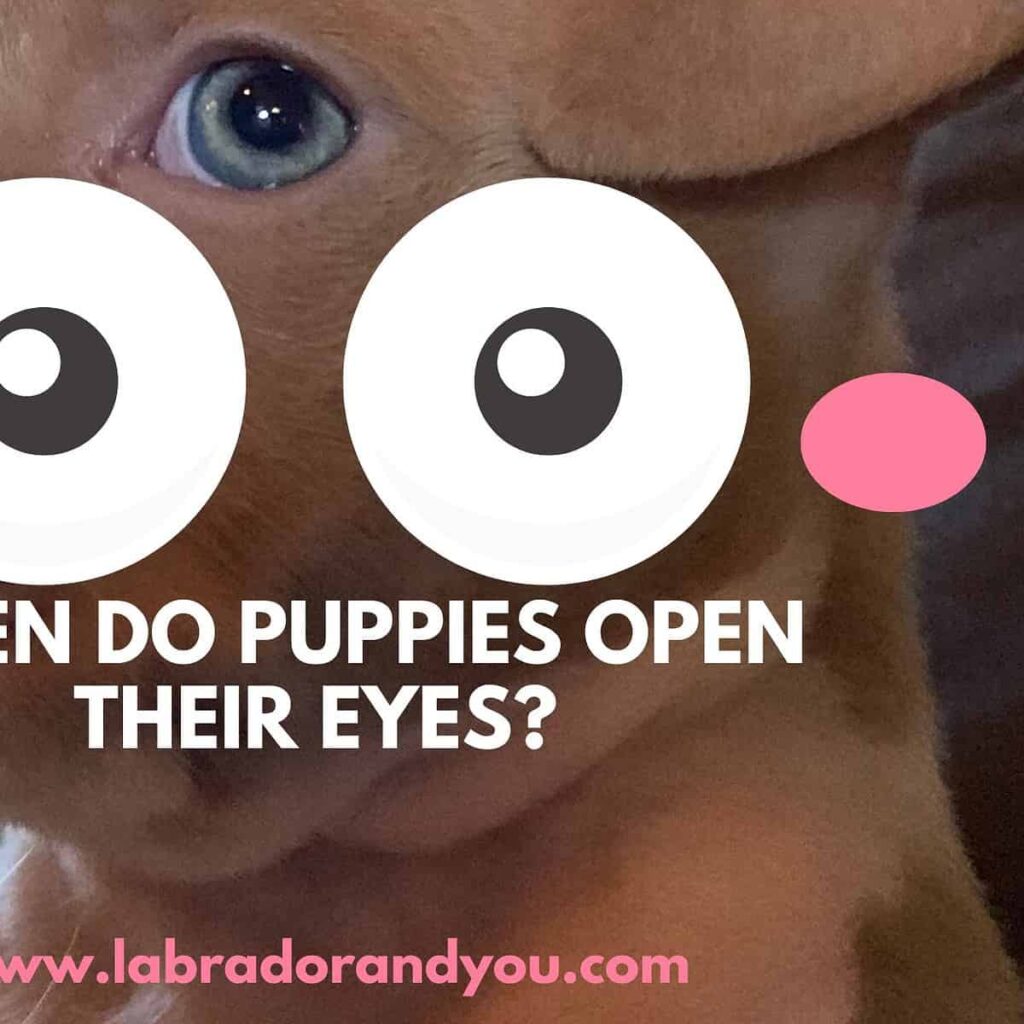Newborn labrador puppies are adorable and require much care. They are completely dependent on their mother for the first few weeks. Their development can be affected by nutrition and socialization. Do you know how to look after your newborn lab puppies?
You must provide proper training, food, toys, etc., for the best development. Monitor their growth and address any issues. The puppies are delicate at this stage and need attention for the best results. I’ll cover each segment in detail so you can follow suit.
Stages Of Newborn Lab Puppy Development
Newborn labs go through four stages of development: Neonatal, Transition, Socialization, and Adolescence.
Neonatal Stage: Birth To Two Weeks
Puppies completely depend on their mother dog in the first 14 days, even for elimination. They cannot regulate their body temperature or relieve themselves without stimulation. They don’t open their eyes even.
- Provide a haven for the new mother and her litter to bond without disturbance.
- Change bedding materials regularly.
- Monitor their health and observe any signs of distress.
Be attentive during the neonatal stage. Early interventions in case of illness ensure better outcomes for not just one affected pup but the entire litter.
Transition Stage: Two To Four Weeks
The transition stage is pivotal from two to four weeks of age. Your little Labrador begins to showcase an array of exciting changes and developments.
The lab puppies open their eyes in the second week. It gives them their first glimpse into the new world. It is a crucial stage to establish a foundation for proper care. They share a bond now with their siblings
To ensure optimal growth during this period, provide high-quality puppy food. Adhere to recommended feeding schedules for best results.
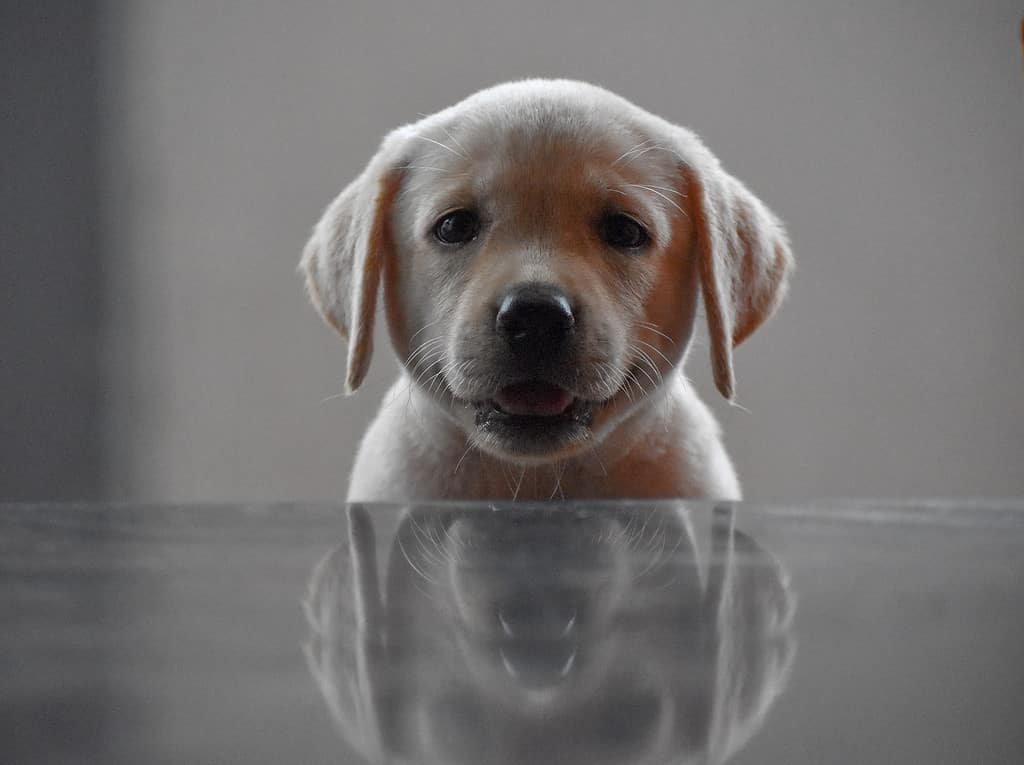
Socialization Stage: Four To Twelve Weeks
The socialization stage spans from four to twelve weeks of age. Newborn Labrador dogs explore their surroundings and interact with other dogs, humans, and new environments.
- The new puppy becomes more curious around 12 weeks old. You can see a lot of vocalizations.
- Expose them to new experiences like meeting different people and animals and hearing unusual sounds.
- Doing so builds confidence in your young pup. It reduces the likelihood of developing fears or anxiety later in life.
- Foster positive socialization by guiding gently through these new situations. Praise and reward good behavior.
Socialization should be done before vaccinations and preferably within a specific time window.
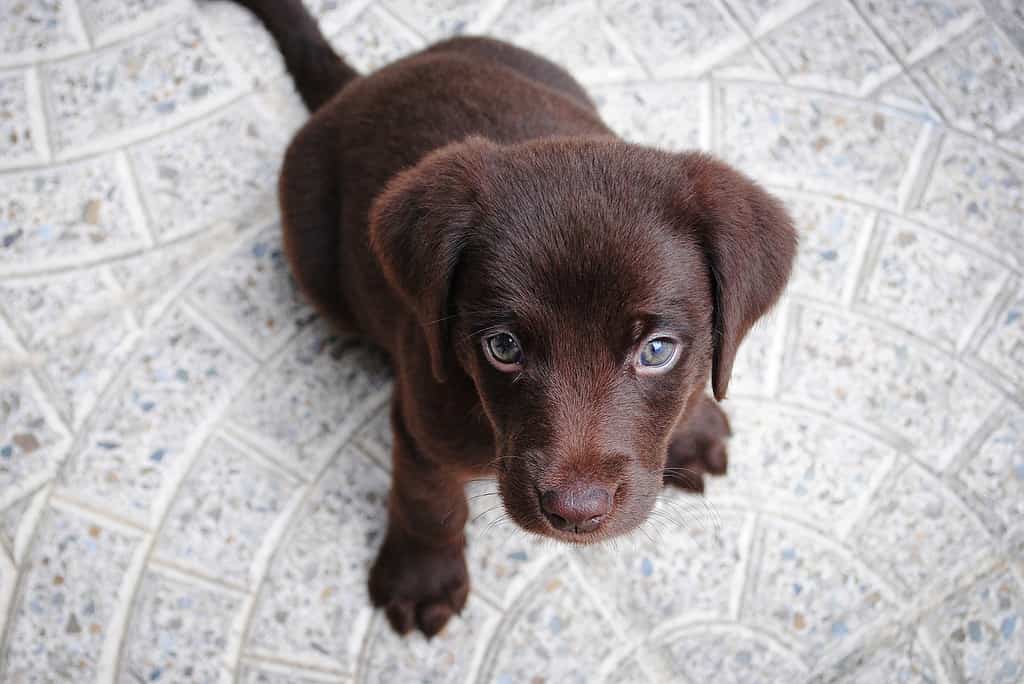
Adolescence: Three To Six Months
Lab pups go through a fast-growing juvenile stage between 3 and 6 months. They will begin to lose their baby teeth and grow their adult set. Lab pups are considered adolescents at six months. Continue training and socializing them during this time. Common challenges during adolescence include chewing, biting, and digging. Maintain regular veterinarian check-ups during this period.
How To Provide Essential Care For newborn lab puppies?
Proper care for your newborn lab puppy ensures they grow healthy and strong. From feeding and nutrition to grooming and hygiene, this section covers everything.
Feeding And Nutrition
Labrador puppies should rely solely on their mother’s milk in the initial weeks. This nutrient-rich milk contains colostrum. It provides antibodies to protect the pup from infections in its early days.
Are you adopting an orphaned puppy?
- Bottle-feeding the babies is required every two to three hours then.
- Buy commercial canine milk replacers or create your formula with a veterinarian-approved recipe.
Vaccinations And Health Checks
Ensure your newborn Lab puppy gets the right vaccinations and health checks.
- Vaccinations can prevent fatal diseases that Labradors are prone to. They include distemper, rabies, and hepatitis.
- The puppy vaccination schedule includes a series of shots. They should be given at specific intervals to ensure maximum protection.
- Start vaccinations early in your puppy’s life, ideally between six and eight weeks old.
- Health checks are essential for newborn labs. Your vet must examine your puppy for any illness or disease.
Grooming And Hygiene
Keep your newborn Lab clean and well-groomed. Regular grooming sessions help bond with your pup, besides keeping their coat shiny and healthy.
- Brush your puppy’s fur daily to prevent matting, tangles, and debris buildup.
- Use dog shampoo specially formulated for puppies for bathing. Human shampoo or soap can irritate their skin.
- Don’t bathe them too often. It can strip their coat of natural oils, which keep them soft and shiny.
Exercise And Playtime
Labs are energetic dogs and require a lot of physical activity.
- An eight-week-old Lab puppy should have two 10-minute exercise sessions daily.
- Provide exercises like walks, runs, playing fetch, or tug-of-war games.
- Use puzzle feeders and chew toys to keep them entertained and mentally stimulated.
- Playtime with other puppies is essential for providing socialization opportunities.
- Adequate exercise prevents behavioral problems like excessive chewing or digging.
- Exercise promotes better sleep patterns. Your pup can rest well at night after an active day.
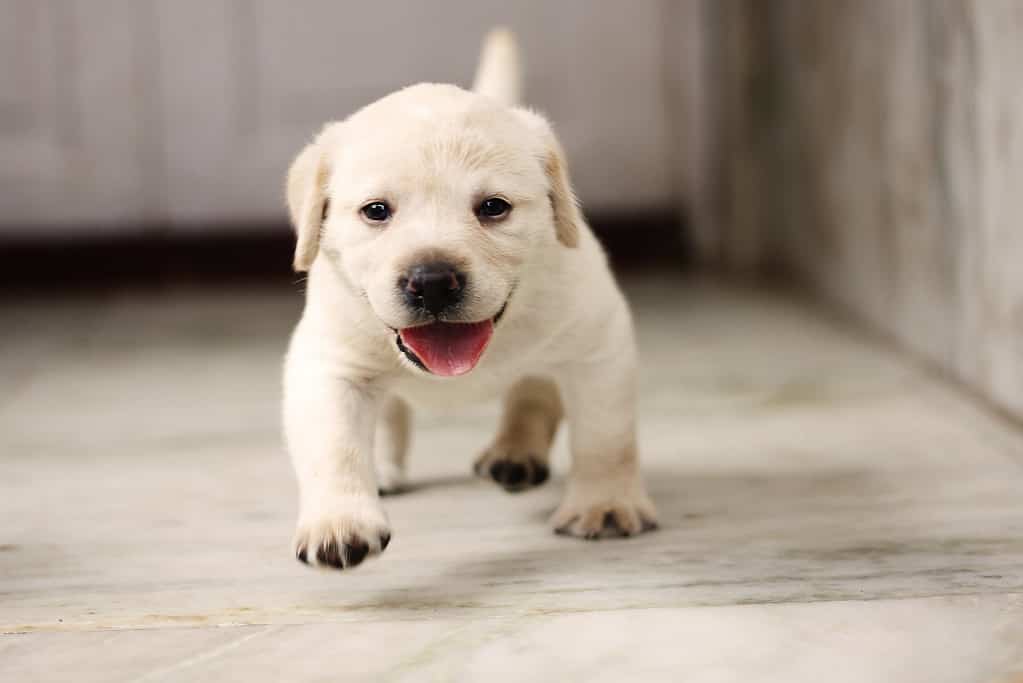
Housebreaking And Potty Training For newborn lab puppies
Here are some housebreaking and potty training tips to help you along the way:
- Establish a routine: Set a feeding schedule. Establish regular digestion habits and take them outside when they finish eating.
- Use positive reinforcement: Reward your pup with treats and praise when they go potty outside to reinforce good behavior.
- Consistency is key: Take your puppy out regularly throughout the day. First thing in the morning, after meals, and before bedtime.
- Watch for signs: Puppies may show signs like sniffing or circling when they need to go potty. Learn their cues to react quickly.
- Use a crate: Crate training can prevent accidents inside the house. Prevent anxiety or discomfort not leaving your pup inside for too long.
- Consider a dog doorbell: It allows your puppy to communicate with you when it’s time to go outside.
Puppies have small bladders. They will need frequent trips outside until they’re fully trained between 4-6 months old. Be patient and consistent.
Training Tips For Your New Lab Puppy
Now we’ll learn about crate training, basic obedience commands, socialization, etc. We’ll talk how to address common challenges like teething and chewing for enhanced training.
Crate Training: Creating A Safe Space
Crate training helps create a safe space for your puppy. It involves introducing your Labrador to a comfortable crate, a special spot to relax, feel secure and sleep peacefully.
Most puppies become comfortable in their crate within 1 to 3 weeks with patience and consistency. During the first few days, open the crate door while allowing them to explore it freely.
You can start feeding them inside once they become familiar with the new surroundings. Place toys to encourage them further. Over time, you can close the door for short periods while staying nearby. It will prevent them from feeling abandoned or scared.
Basic Obedience Commands: Sit, Stay, Come
Here are some tips on how to teach them to sit, stay, and come:
- Sit: Hold a treat before your puppy’s nose and slowly move it upwards, saying, “Sit.” Their bottom will be naturally lower when they tilt their head back to follow the treat. Once they are in the sitting position, give them the treat and praise them.
- Stay: Have your puppy sit first. Then hold your hand with your palm facing them and say, “Stay.” Take a step back, then immediately return to them and give them a treat if they stay put. Gradually increase the distance between you and your puppy as they get better at staying.
- Come: Start with short distances when calling your puppy over, saying, “Come.” Clap or pat your legs to get their attention. Give them a treat once they arrive, even if it takes some time for them to obey.
Positive reinforcement is key. Reward good behavior with treats or praise instead of punishing bad behavior. Keep training sessions short (10-15 minutes) and frequent (several times daily).
Common Challenges And Solutions: Teething, Biting, Chewing
Labrador puppies are “mouthy” and chew on things. It is a common challenge associated with their teething and biting behavior. Here are some solutions to manage them:
- Avoid Rough Play: Rough play can encourage your puppy to bite harder. Discouraging this behavior is vital.
- Provide Chew Toys: Give your lab puppy appropriate chew toys. It alleviates discomfort caused by teething and prevents destructive chewing.
- Redirection: If your puppy starts biting or chewing on something, it shouldn’t be directed to an appropriate chew toy.
- Training: Teaching basic obedience commands like “sit” and “leave it” helps manage them better.
- Socializing: Socializing your lab puppy early reduce anxiety contributing to destructive chewing behavior.
Bonding with Newborn lab puppies
Bonding with your labrador pup is crucial to enjoying a happy life together. Create opportunities for one-on-one time and positive experiences.
Establish a loving relationship through bonding with your Labrador. Spending quality time with your furry friend deepens the bond.
- Take them on walks, play fetch, and cuddle up together.
- Spend time together and pay attention to your pup’s needs and body language. It improves communication and trust.
- Understand when they want to play or rest.
- Notice their likes and dislikes of toys or treats.
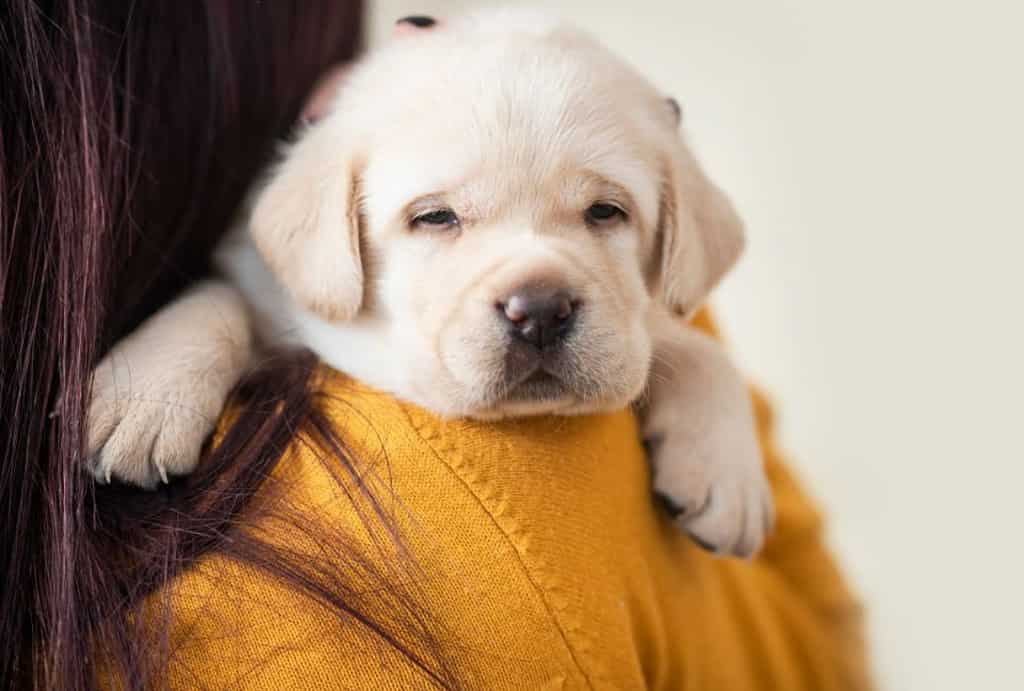
Creating A Safe And Fun Environment: Puppy-Proofing
Create a safe and fun environment for your newborn lab puppy. It is important to “puppy-proof” your home and garden. Carefully examine each room for hazards. Electrical cords, poisonous plants, or small objects that could be swallowed must be removed. Secure fences and gates in outdoor areas where your lab puppy will play.
Continuing Education And Training: Advanced Training, Tricks
Now you can move on to advanced training techniques and tricks to keep them challenged.
- Agility Training: Set up an obstacle course in your backyard or enroll your puppy in an agility class. This sport is great for building confidence, coordination, and physical fitness.
- Retrieval Games: As natural retrievers, Labs love to fetch! You can teach them to retrieve specific items by name or even play hide-and-seek games.
- Tracking: Labs have a great sense of smell, making them perfect candidates for tracking games! Start by hiding treats around the house or yard. Gradually progress to more challenging scent trails.
- Tricks: Teaching your Lab new tricks is a fun way to bond with your pet. Tricks like “roll over” and “play dead,” jumping through hoops, or balancing objects on their nose benefits.
Maintaining Good Health And Wellness: Regular Check-Ups
Regular check-ups ensure your Labrador grows healthy and strong. The vet pictures physical exams to detect potential health problems before they become serious. They advise on vaccinations and preventative measures.
Keep their weight in check through balanced meals and exercise. Labs have great appetites. Train them early on what is allowed or not allowed.
FAQs
How big are newborn labradors?
A: Newborn Labrador puppies typically weigh around 1 pound and are about 8-12 inches long.
How many puppies do Labs have the first time?
A: Labrador retrievers can have 1 to 12 puppies in their first litter, but the average is 6 to 8.
How do you take care of a newborn Labrador puppy?
A: To care for a newborn Labrador puppy, ensure it stays warm. Feed it every 2-3 hours, help it eliminate waste, and keep it clean.
When can you touch newborn puppies?
A: You can touch newborn dogs when necessary. Avoid handling them too much in the first few weeks. They are delicate, and their immune systems are still developing.
What to do when your Lab is having puppies?
A: Provide a quiet and comfortable space for her to give birth. Assist them if needed, and monitor the puppies’ health and development.
When can mom dog sleep away from puppies?
A: The mom dog can sleep away from the puppies once they are weaned. It is at around 4-6 weeks of age.
How often do newborn Labrador puppies eat?
A: Newborn Labrador puppies should be fed every 2-3 hours or on demand. Follow this until they are about 3-4 weeks old and can start eating dog food.
Can a 4-week-old puppy survive without a mom?
A: A 4-week-old puppy can survive without its mom. It must be fed with a milk replacer every few hours, requiring extra care and attention.
Will a black Lab only have black puppies?
A: Not necessarily. Depending on the parents’ genetics, a black Lab can have black, yellow, or chocolate puppies.
How do newborn puppies find their mom?
A: Newborn puppies use their sense of smell to find their mom. Mother Dog produces a unique scent that they recognize and follow.
What color puppies will 2 chocolate Labs have?
A: Two chocolate Labs can have chocolate, black, or yellow puppies. It depends on the parents’ genetics.
How much is a chocolate brown Labrador?
A: The price of a chocolate brown Labrador varies depending on location, breeder, and pedigree. It can range from a few hundred to a few thousand dollars.
What are the most Lab puppies in one litter?
A: The largest recorded litter of Labrador retriever puppies is 19.
Author Profile

- Lifetime dog Enthusiast
- Shradha is a seasoned writer at Labradorandyou.com, an authoritative resource for all things Labrador Retriever. Her experience as a pet owner and dog enthusiast drives her to create meticulously researched and fact-checked content, offering valuable insights on Labrador training, grooming, and health. Each article reflects Shradha's passion and dedication, enriched by personal experiences with her beloved Labradors, Tom, and Kurt. Whether exploring breed-specific training techniques or providing product reviews, Shradha ensures Labrador owners receive the most accurate, up-to-date, and trustworthy information, aimed at enhancing their companions' health and happiness
Also by the author
-
 Lab-TypesJune 30, 2025Мостбет Букмекер: Официальный Сайт Игровых Автоматов Mostbet Bookmaker
Lab-TypesJune 30, 2025Мостбет Букмекер: Официальный Сайт Игровых Автоматов Mostbet Bookmaker
-
 MonobrandJune 30, 2025Fontan Casino ️ One Hundred Pln Darmowy Zakład Bez Depozytu
MonobrandJune 30, 2025Fontan Casino ️ One Hundred Pln Darmowy Zakład Bez Depozytu
-
 Lab-TypesJune 30, 20251xbet Зеркало рабочее На Сегодня прохода На Сайт 1хбет Обновлено!
Lab-TypesJune 30, 20251xbet Зеркало рабочее На Сегодня прохода На Сайт 1хбет Обновлено!
-
 Lab-TypesJune 30, 2025Мостбет Mostbet Букмекерская Контора: Зеркало, Официальный Сайт, Бонус При Регистрации
Lab-TypesJune 30, 2025Мостбет Mostbet Букмекерская Контора: Зеркало, Официальный Сайт, Бонус При Регистрации
